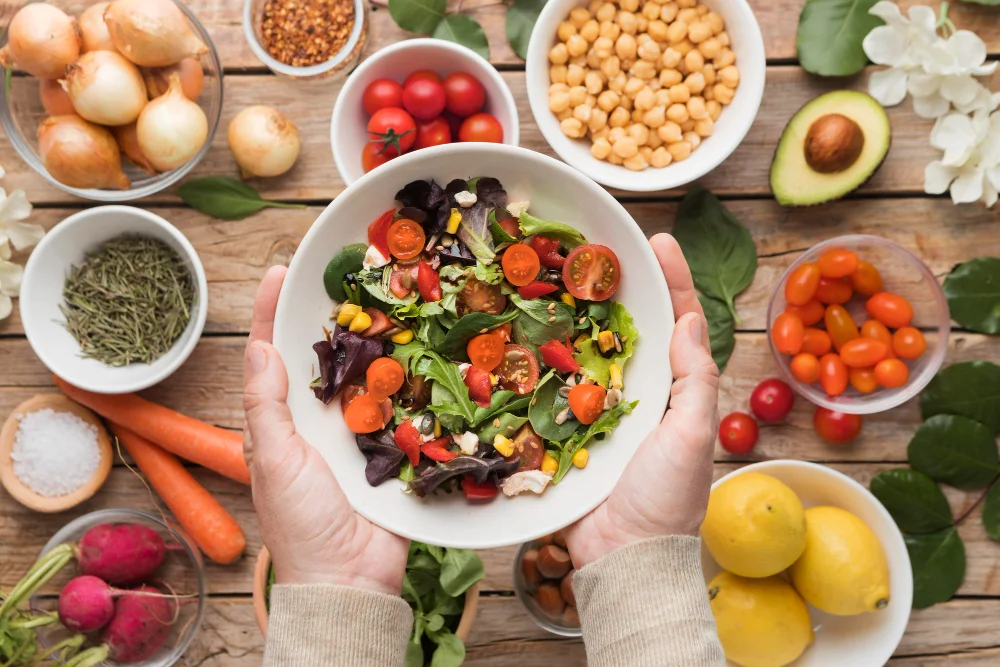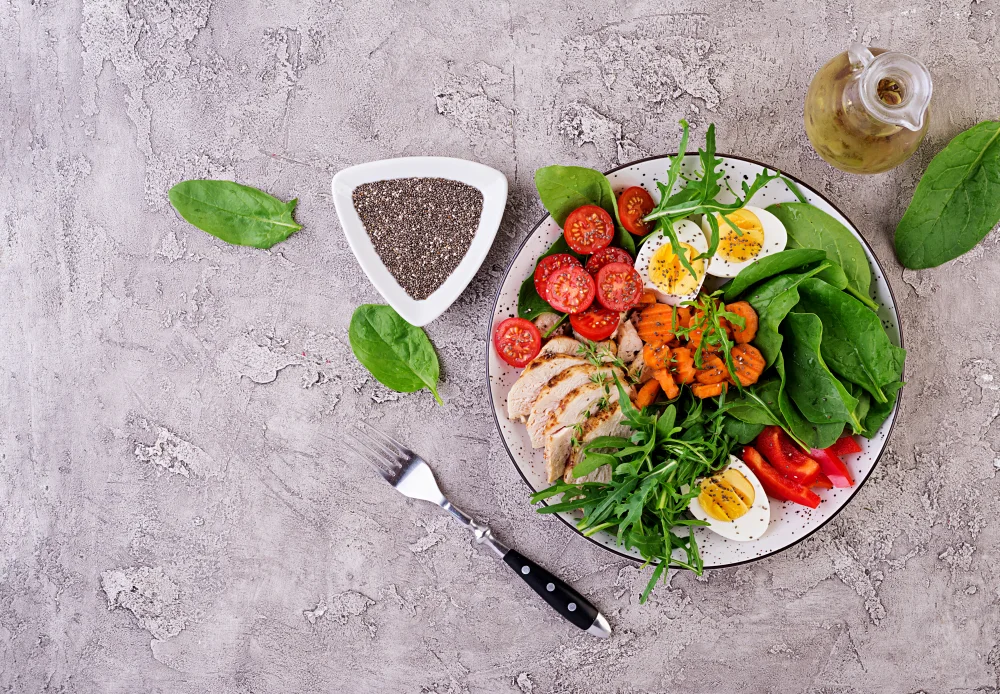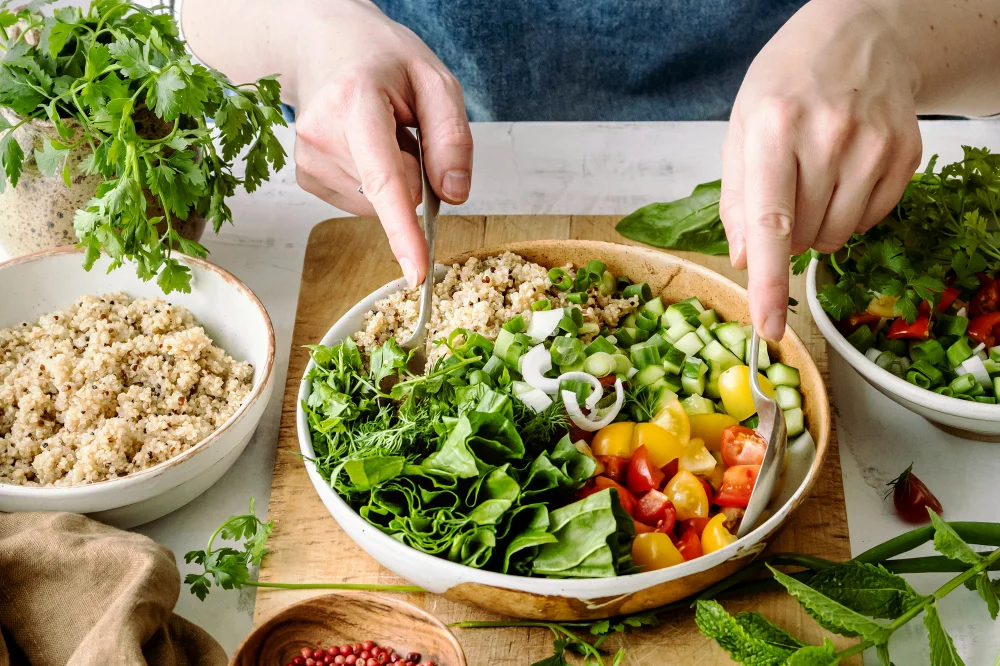When it comes to eating well, it’s easy to get lost in trends and myths. But the truth is, the healthiest foods are often simple, natural, and already in your kitchen. They don’t need to be expensive or exotic; they just need to be balanced and nourishing.
Choosing the healthiest foods isn’t about restricting yourself. It’s about making small, consistent changes that align with your lifestyle. This approach can support your immunity, improve energy, and even boost your mood over time.
Understanding the impact of food on your body helps you make better decisions. The goal isn’t perfection but progress. By adding more nutrient-dense foods to your daily meals, you take a smart step toward long-term health and vitality.
Leafy Greens: The Foundation of Healthiest Foods
Leafy greens like spinach, kale, and Swiss chard are packed with fibre, vitamins, and minerals. These low-calorie foods are excellent for digestion, heart health, and reducing inflammation. They contain iron, calcium, magnesium, and powerful antioxidants that help detoxify the body and protect against chronic diseases.
These vegetables are versatile in cooking, whether in salads, smoothies, soups, or stir-fries. Adding just one serving of leafy greens per day can lead to noticeable improvements in energy levels, skin clarity, and gut health.
Nuts and Seeds: Small But Mighty

Nuts and seeds are nutritional goldmines. Almonds, chia seeds, walnuts, and flaxseeds deliver healthy fats, plant-based protein, fibre, and a variety of essential vitamins. These foods help lower bad cholesterol, support heart function, and keep you feeling full longer.
They are easy to include in your diet:
- Sprinkle flaxseeds on your yoghurt or smoothie
- Snack on almonds between meals
- Add chia seeds to overnight oats
- Use pumpkin seeds as a salad topping
Berries: Small in Size, Big on Benefits
Berries such as blueberries, strawberries, and raspberries are some of the healthiest foods you can eat. They’re loaded with antioxidants that combat oxidative stress, which contributes to ageing and disease. Their high fibre content also supports digestion and blood sugar control.
Incorporating berries into your breakfast, snacks, or desserts provides a sweet flavour while nourishing your body. They may even help improve brain function and reduce inflammation thanks to their rich phytonutrient content.
Fatty Fish: Healthiest Foods for Heart and Brain
Fatty fish like salmon, mackerel, and sardines are rich in omega-3 fatty acids, essential fats that support heart health and brain function. These fish also provide vitamin D, protein, and antioxidants like selenium, which help reduce inflammation.
Regular consumption of fatty fish can lead to:
- Lower risk of heart disease
- Improved mood and mental clarity
- Better eye and joint health
- Reduced symptoms of depression
Cruciferous Vegetables: Disease-Fighting Superfoods

Cruciferous vegetables like broccoli, cauliflower, and Brussels sprouts contain compounds called glucosinolates, which are known for their cancer-fighting properties. They’re also high in fibre, vitamin C, and folate important for immune health and detoxification.
They’re best cooked lightly to retain nutrients and are great additions to stir-fries, roasted veggie bowls, or even raw salads. Regular intake of these veggies supports digestion, liver function, and hormonal balance.
Whole Grain Foods: Energy and Satiety
Whole grains such as quinoa, brown rice, oats, and barley are high in fibre, B vitamins, and minerals like iron and magnesium. These complex carbohydrates release energy slowly, keeping blood sugar stable and hunger at bay.
Eating whole grains daily offers benefits such as:
- Improved digestive health
- Lower cholesterol levels
- Long-lasting energy
- Better weight management
Legumes: Among the Healthiest Foods for Plant-Based Protein
Beans, lentils, and chickpeas are packed with protein, fibre, and slow-digesting carbs. They help regulate blood sugar, reduce cholesterol, and promote feelings of fullness. Their low cost and versatility make them easy to include in any meal.
You can enjoy legumes in soups, salads, curries, or even as healthy dips like hummus. Their nutrients also support heart, brain, and digestive health over time.
Sweet Potatoes: Healthiest Foods for Nutrient-Rich Comfort

Sweet potatoes are rich in beta-carotene, which converts to vitamin A, essential for eye and skin health. They’re also high in potassium and fibre, making them excellent for blood pressure control and gut function.
They can be baked, mashed, or roasted and offer a naturally sweet flavour that satisfies cravings. Sweet potatoes are perfect for people looking for comfort food with real nutritional value.
Avocados: The Healthiest Foods for the Heart
Avocados provide heart-healthy monounsaturated fats, fibre, and nearly 20 different vitamins and minerals. They support cholesterol control, brain health, and help absorb nutrients from other foods.
You can enjoy avocados in several ways:
- Spread on toast
- Blended into smoothies
- Mixed into salads or guacamole
- As a creamy topping on whole-grain bowls
Final Thought on Healthiest Foods
The healthiest foods are simple, accessible, and full of life-giving nutrients. When you shift your mindset to focus on nourishment instead of restriction, everything changes. Eating well becomes a joy, not a burden.
Consistency is more important than perfection. Even minor daily improvements like swapping sugary snacks for berries or white rice for quinoa can make a big difference. Listen to your body and adjust based on what feels right for you.
In the end, healthy eating isn’t about trends. It’s about balance, variety, and long-term support for your body and mind. The most nutritious foods are already within reach, just waiting for you to enjoy them.










